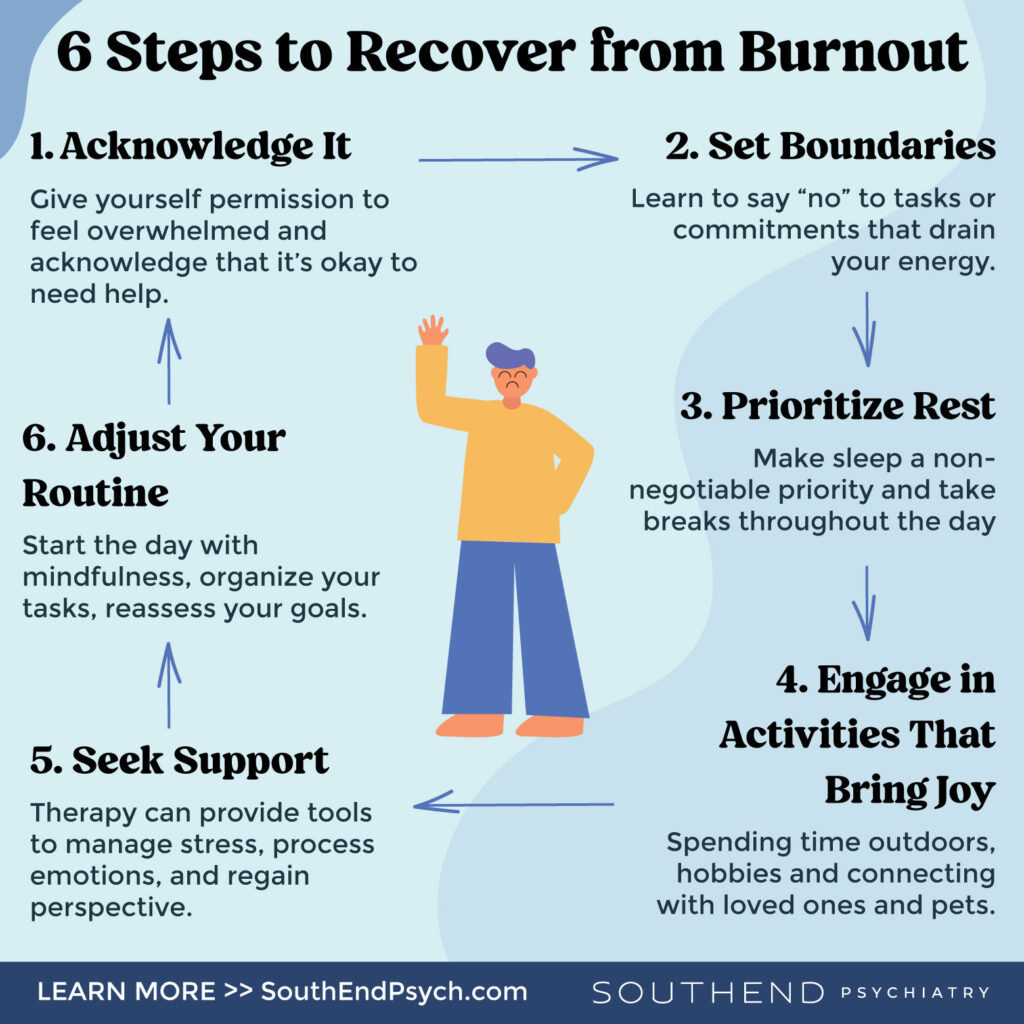As January rolls in, many people return to work routines and everyday demands with a mix of optimism and lingering fatigue from the previous year. While it’s natural to feel the post-holiday adjustment, for some, it may signal something deeper—burnout. Burnout is more than being tired; it’s a state of physical, mental, and emotional exhaustion caused by prolonged stress, often linked to work or overwhelming responsibilities. SouthEnd Psychiatry is bringing awareness to the warning signs and ways to take action which is key to recovery and prevention.
What is Burnout?
Burnout is a response to chronic stress where you feel emotionally drained, mentally fatigued, and disconnected. Unlike occasional tiredness, burnout doesn’t just go away with a good night’s sleep. It can impact every aspect of your life, including your relationships, productivity, and overall well-being.
Burnout often occurs in people who:
- Work in demanding or high-pressure environments
- Juggle multiple roles, like working parents or caregivers
- Have perfectionist tendencies or unrealistic expectations
- Lack work-life balance or proper boundaries
Warning Signs of Burnout
Recognizing burnout starts with paying attention to your body, emotions, and behavior. Here are common warning signs:
1. Physical Symptoms
- Chronic fatigue and exhaustion, even after rest
- Frequent headaches, muscle pain, or gastrointestinal issues
- Trouble sleeping or waking up feeling unrefreshed
2. Emotional Symptoms
- Feeling detached, unmotivated, or emotionally numb
- Increased irritability, frustration, or anxiety
- A sense of hopelessness or feeling “stuck”
3. Behavioral Symptoms
- Declining performance or inability to concentrate
- Avoiding responsibilities or procrastinating
- Withdrawal from family, friends, or social activities
If you notice these signs, it’s time to take burnout seriously. Ignoring it can lead to more severe health issues, including anxiety, depression, and long-term physical illness.
Practical Steps to Recover from Burnout
Recovering from burnout takes time and a proactive approach to reduce stress and restore balance. Here are practical steps you can take to get back on track:
1. Acknowledge It
The first step toward healing is recognizing that you’re experiencing burnout. Give yourself permission to feel overwhelmed and acknowledge that it’s okay to need help.
2. Set Boundaries
- Learn to say “no” to tasks or commitments that drain your energy.
- Limit after-hours work or constant availability, especially in high-stress jobs.
- Establish time for yourself to unwind and recharge each day.
3. Prioritize Rest and Recovery
- Make sleep a non-negotiable priority. Aim for 7-9 hours of quality rest.
- Take breaks throughout the day, even if it’s just for a few deep breaths, a walk, or time away from screens.
- Schedule time off for yourself, including weekends and vacations to reset.
4. Engage in Activities That Bring Joy
Burnout can leave you feeling disconnected from things you once enjoyed. Slowly reintroduce activities that bring you happiness, such as:
- Exercising or spending time outdoors
- Hobbies like painting, cooking, reading, or listening to music
- Connecting with loved ones or pets
5. Seek Support
- Talk to trusted friends, family members, or colleagues about how you’re feeling.
- Reach out to a mental health professional for guidance. Therapy can provide tools to manage stress, process emotions, and regain perspective.
6. Adjust Your Routine
Small, consistent changes can make a big difference.
- Start the day with mindfulness or journaling to set a positive tone.
- Organize your tasks, breaking larger projects into smaller, manageable steps.
- Reassess your goals to ensure they’re realistic and achievable.

Burnout Prevention: Long-Term Strategies
Recovering from burnout is only half the battle. The other half is building habits that prevent it from returning. Here are a few strategies:
- Focus on Work-Life Balance: Make time for rest, hobbies, and relationships outside of work.
- Incorporate Stress Management Techniques: Practices like mindfulness, meditation, and breathing exercises can reduce daily stress.
- Stay Physically Active: Regular exercise not only improves your mood but also helps combat fatigue.
- Take Regular Breaks: Short breaks throughout the day can improve productivity and prevent exhaustion.
The Importance of Seeking Help
Burnout can feel isolating, but you’re not alone. Professional support can help you navigate the overwhelming feelings and develop strategies to recover and thrive. If you’re experiencing persistent stress, exhaustion, or hopelessness, reaching out to a mental health professional can be the first step toward healing.
Finding Your Way Back to Balance
Burnout doesn’t happen overnight, and recovery takes time. The new year is the perfect opportunity to reset, prioritize your well-being, and make changes that will support your mental and emotional health for the long term.
At Southend Psychiatry, we’re here to guide you every step of the way. If you’re struggling with burnout or chronic stress, let’s work together to restore your balance and well-being.
Contact us today to get started. Your health and happiness are worth it.
Southend Psychiatry
Schedule your appointment today with one of our SouthEnd Psychiatry clinicians. Book your appointment online or call 1-800-632-7969 to get started today.



